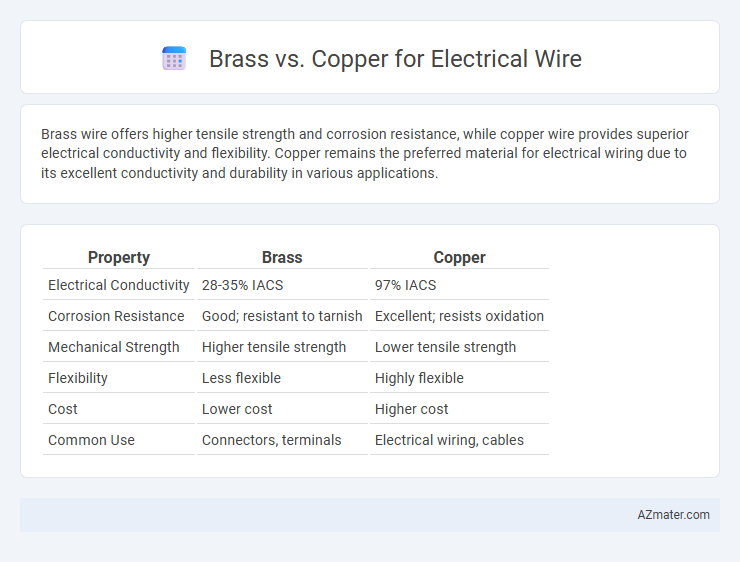Brass wire offers higher tensile strength and corrosion resistance, while copper wire provides superior electrical conductivity and flexibility. Copper remains the preferred material for electrical wiring due to its excellent conductivity and durability in various applications.
Table of Comparison
| Property | Brass | Copper |
|---|---|---|
| Electrical Conductivity | 28-35% IACS | 97% IACS |
| Corrosion Resistance | Good; resistant to tarnish | Excellent; resists oxidation |
| Mechanical Strength | Higher tensile strength | Lower tensile strength |
| Flexibility | Less flexible | Highly flexible |
| Cost | Lower cost | Higher cost |
| Common Use | Connectors, terminals | Electrical wiring, cables |
Introduction to Brass and Copper in Electrical Wiring
Brass and copper are two commonly used materials in electrical wiring, each with distinct properties influencing their application. Copper offers excellent electrical conductivity and flexibility, making it the preferred choice for most electrical wiring installations. Brass, an alloy of copper and zinc, provides greater mechanical strength and corrosion resistance but has lower conductivity, which limits its use primarily to connectors and terminals rather than main wiring.
Electrical Conductivity: Brass vs. Copper
Copper exhibits superior electrical conductivity, approximately 5.96 x 10^7 S/m at room temperature, making it the preferred choice for most electrical wiring applications. Brass, an alloy of copper and zinc, has significantly lower conductivity, typically around 1.5 to 2.0 x 10^7 S/m, resulting in higher resistance and energy loss. This conductivity difference affects efficiency and heat generation, with copper wires delivering optimal performance in electrical circuits.
Cost Comparison: Brass vs. Copper Wires
Copper wires generally cost more than brass wires due to copper's higher conductivity and demand in electrical applications. Brass wires, an alloy of copper and zinc, are less expensive but also have lower electrical conductivity, making them a cost-effective option for certain non-critical wiring tasks. When prioritizing budget, brass offers savings, while copper provides superior performance and longevity in electrical systems.
Mechanical Strength and Durability
Brass exhibits higher mechanical strength and better resistance to wear and corrosion compared to copper, making it suitable for applications requiring durability under mechanical stress. Copper provides superior electrical conductivity but is softer and more prone to deformation under repeated mechanical loads. Choosing brass wire enhances longevity in high-stress environments, while copper remains preferred for optimal electrical performance.
Corrosion Resistance and Longevity
Brass offers superior corrosion resistance compared to pure copper, making it suitable for environments exposed to moisture and chemicals, which extends the lifespan of electrical wiring. Copper, known for its excellent conductivity, can still suffer from oxidation and corrosion over time, especially in harsh conditions, potentially reducing its durability. Choosing brass wire often results in longer-lasting electrical components, while copper remains preferred for applications prioritizing optimal electrical performance.
Flexibility and Ease of Installation
Brass exhibits lower flexibility compared to copper, making copper the preferred choice for electrical wiring requiring frequent bending or complex routing. Copper's high ductility allows for easier installation in tight spaces and reduces wire breakage during handling. While brass offers enhanced corrosion resistance and mechanical strength, copper's superior malleability ensures smoother, more efficient installation processes in electrical applications.
Safety Considerations
Brass electrical wires, composed of copper and zinc alloys, offer higher strength but lower conductivity than pure copper, leading to increased heat generation and potential fire hazards if not properly rated for load. Copper wires provide superior conductivity and thermal resistance, reducing the risk of overheating and ensuring safer electrical performance in residential and industrial applications. Choosing copper over brass for electrical wiring aligns with stricter safety standards and enhances long-term circuit reliability by minimizing electrical resistance and heat buildup.
Applications in Electrical Systems
Brass, an alloy of copper and zinc, offers superior mechanical strength and corrosion resistance, making it ideal for electrical connectors, terminals, and switch components where durability is critical. Copper wire, renowned for its excellent electrical conductivity and flexibility, is predominantly used in power transmission, electrical wiring, and circuit board applications to ensure efficient current flow. Both materials are essential in electrical systems, with copper favored for main wiring due to minimal resistance, and brass preferred in hardware requiring robustness and wear resistance.
Environmental Impact and Recyclability
Copper electrical wire offers superior recyclability with a recycling rate exceeding 90%, significantly reducing environmental impact through minimized mining and energy consumption. Brass, an alloy of copper and zinc, is less commonly recycled for wiring, leading to lower reclamation rates and higher resource extraction. The use of copper wiring supports sustainable practices by conserving natural resources and lowering greenhouse gas emissions compared to brass alternatives.
Choosing the Right Material for Electrical Wiring
Copper offers superior electrical conductivity and corrosion resistance, making it the preferred choice for most electrical wiring applications. Brass, an alloy of copper and zinc, provides greater mechanical strength and durability but has lower conductivity, resulting in higher energy loss. Selecting between brass and copper depends on balancing conductivity needs, mechanical strength, and cost efficiency for specific electrical projects.

Infographic: Brass vs Copper for Electrical Wire
 azmater.com
azmater.com